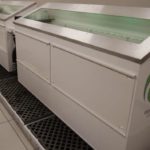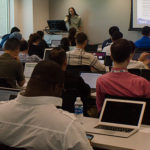In this TACC podcast, Suzanne Pierce from the Texas Advanced Computing Center describes her upcoming panel discussion on AI and water management and the work TACC is doing to support efforts to bridge advanced computing with Earth science. “It’s about letting the AI help us be better decision makers. And it helps us move towards answering, discussing, and exploring the questions that are most important and most critical for our quality of life and our communities so that we can develop a future together that’s brighter.”
Search Results for: tacc
TACC and DOD to Co-Develop Novel Computational Approaches
Today the Texas Advanced Computing Center announced a partnership with the U.S. Department of Defense to provide researchers with access to advanced computing resources as part of an effort to develop novel computational approaches for complex manufacturing and design problems. “TRADES, which stands for TRAnsformative DESign, is a program within the DOD Defense Advanced Research Projects Agency (DARPA). The essence of the program is to synthesize components of complex mechanical platforms (e.g., ground vehicles, ships, or air and space craft), which leverage advanced materials and manufacturing methods such as direct digital manufacturing.
GRC Builds GPU-Based Immersion Cluster for TACC
Green Revolution Cooling has announced plans to deliver a custom GPU-based cluster to the Texas Advanced Computing Center (TACC). Our goal is to make HPC more affordable. Offering lower cost, energy dense servers that take full advantage of our highly efficient CarnotJet cooling system is a huge benefit to our customers,” said Larry Stone, VP of Engineering at GRC “we are seeing a growing number of people opt for servers designed for immersion, over traditional big brand OEM hardware.”
Researchers Use TACC, SDSC and NASA Supercomputers to Forecast Corona of the Sun
Predictive Sciences ran a large-scale simulation of the Sun’s surface in preparation for a prediction of what the solar corona will look like during the eclipse. “The Solar eclipse allows us to see levels of the solar corona not possible even with the most powerful telescopes and spacecraft,” said Niall Gaffney, a former Hubble scientist and director of Data Intensive Computing at the Texas Advanced Computing Center. “It also gives high performance computing researchers who model high energy plasmas the unique ability to test our understanding of magnetohydrodynamics at a scale and environment not possible anywhere else.”
Podcast: 18 Petaflop Stampede 2 Supercomputer Powers Research at TACC
In this Texas Standard podcast, Dan Stanzione from TACC describes Stampede2, the most powerful university supercomputer in the United States. “Phase 1 of the Stampede2 rollout, now complete, features 4,200 Knights Landing (KNL) nodes, the second generation of processors based on Intel’s Many Integrated Core (MIC) architecture. Later this summer Phase 2 will add 1,736 Intel Xeon Skylake nodes.”
18 Petaflop Stampede2 Supercomputer Dedicated at TACC
Stampede2 is the newest strategic supercomputing resource for the nation’s research and education community, enabling scientists and engineers across the U.S., from multiple disciplines, to answer questions at the forefront of science and engineering. “Building on the success of the initial Stampede system, the Stampede team has partnered with other institutions as well as industry to bring the latest in forward-looking computing technologies combined with deep computational and data science expertise to take on some of the most challenging science and engineering frontiers,” said Irene Qualters, director of NSF’s Office of Advanced Cyberinfrastructure.
Supercomputing DNA Packing in Nuclei at TACC
Aaron Dubrow writes that researchers at the University of Texas Medical Branch are exploring DNA folding and cellular packing with supercomputing power from TACC. “In the field of molecular biology, there’s a wonderful interplay between theory, experiment and simulation,” Pettitt said. “We take parameters of experiments and see if they agree with the simulations and theories. This becomes the scientific method for how we now advance our hypotheses.”
Supercomputing the Secrets of the Snake Genome at TACC
Researchers at the University of Texas at Arlington are using TACC supercomputers to study the unique traits of snake evolution. Led by assistant professor of biology Todd Castoe, the team is exploring the genomes of snakes and lizards to answer critical questions about these creatures’ evolutionary history. For instance, how did they develop venom? How do they regenerate their organs? And how do evolutionarily-derived variations in genes lead to variations in how organisms look and function? “Some of the most basic questions drive our research. Yet trying to understand the genetic explanations of such questions is surprisingly difficult considering most vertebrate genomes, including our own, are made up of literally billions of DNA bases that can determine how an organism looks and functions,” says Castoe. “Understanding these links between differences in DNA and differences in form and function is central to understanding biology and disease, and investigating these critical links requires massive computing power.”
TACC to Hosts HPC for Managers Institute in Austin
Today the TACC announced that the first High Performance Computing for Managers Institute will take place September 12-14 in Austin. “With course materials by TACC and the Numerical Algorithms Group, this three-day workshop is specifically tailored to managers and decision makers who are using, or considering using, HPC within their organizations. It is also applicable to those with a real opportunity to make this career step in the future.”
Avere Systems Powers BioTeam Test Lab at TACC
“In cooperation with vendors and TACC, BioTeam utilizes the lab to evaluate solutions for its clients by standing up, configuring and testing new infrastructure under conditions relevant to life sciences in order to deliver on its mission of providing objective, vendor agnostic solutions to researchers. The life sciences community is producing increasingly large amounts of data from sources ranging from laboratory analytical devices, to research, to patient data, which is putting IT organizations under pressure to support these growing workloads.”









